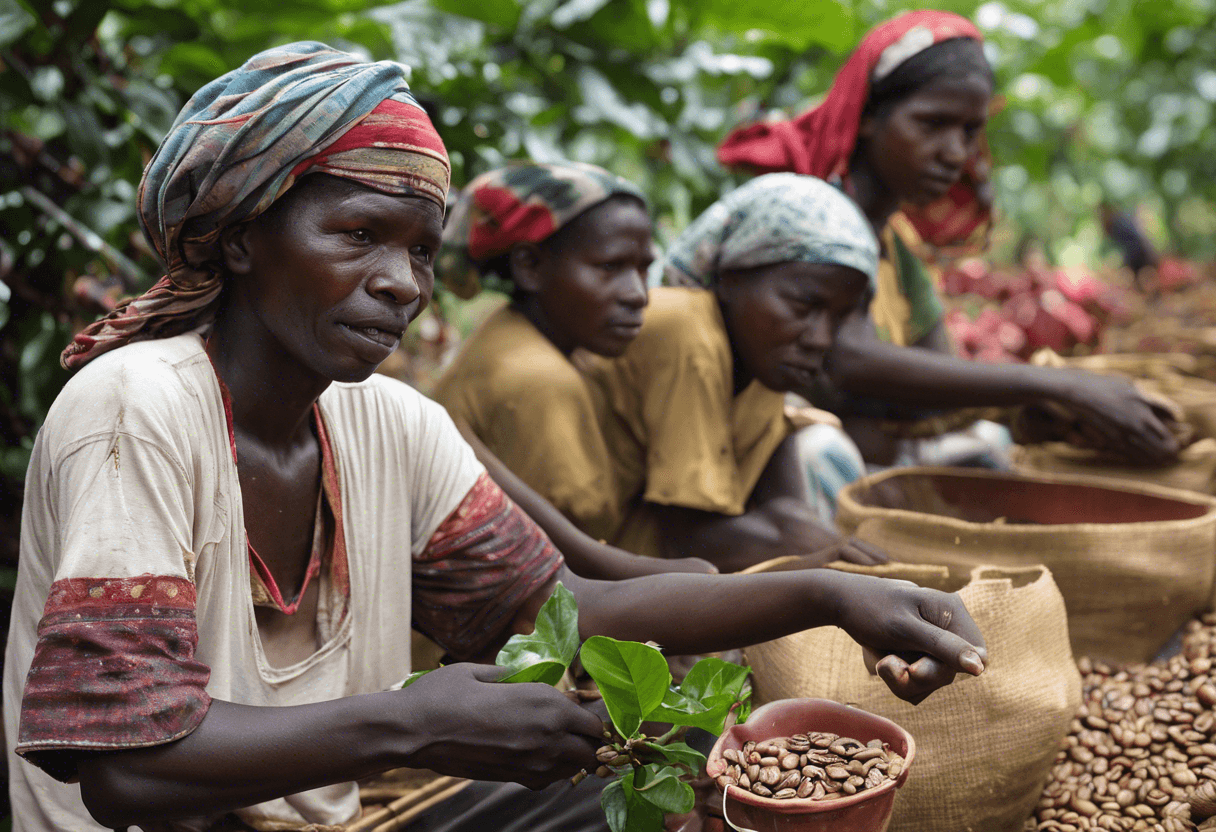The impact of fair trade on coffee farmers



Coffee - The Untold Story of Exploitation and Hope
Coffee, the beloved beverage of millions around the world. We savor its rich aroma and flavor, but have we ever stopped to think about the people behind the coffee? The farmers who toil day and night to bring this delicious brew to our tables? Unfortunately, the story of coffee farmers is marked by exploitation, poverty, and hopelessness. But there is a ray of hope - fair trade.
The Coffee Industry's Dark Underbelly
The coffee industry is a complex web of farmers, traders, roasters, and retailers, each taking a share of the profit. However, the ones who suffer the most are the coffee farmers, who often receive a meager price for their hard work. It's a staggering fact that many coffee farmers live in poverty, earning less than $2 per day, which is below the international poverty line. They are often exploited by traders and middlemen, who take advantage of their lack of knowledge and bargaining power.
Coffee farming is a labor-intensive process, and many farmers struggle to meet the demands of international buyers. They face challenges such as climate change, pests, and diseases, which can lead to crop failures and decreased yields. The use of pesticides and agrochemicals has become widespread, posing a significant threat to the environment and human health.
The Dawn of Fair Trade
Fair trade was born in the 1960s as a response to the injustices faced by coffee farmers. The first fair trade coffee was sold in the Netherlands in 1967, and since then, the movement has grown significantly. Fair trade certification is offered by organizations such as Fairtrade International, which sets strict standards for coffee production and trade.
The core principles of fair trade are simple yet powerful:
- Fair price: Farmers receive a fair and stable price for their coffee, which is higher than the market price.
- Fair labor conditions: Farmers and workers are treated with dignity and respect, and child labor is prohibited.
- Direct trade: Fair trade organizations connect farmers directly with buyers, cutting out middlemen and ensuring that farmers receive a higher share of the profit.
- Community development: Fair trade premiums are invested in community development projects, such as education, healthcare, and infrastructure.
The Power of Fair Trade
So, how does fair trade impact coffee farmers? The benefits are numerous and far-reaching.
A Fair Income
Fair trade certification ensures that coffee farmers receive a fair price for their coffee, which is higher than the market price. This increased income has a significant impact on farmers' livelihoods, enabling them to invest in their farms, communities, and families. According to Fairtrade International, fair trade farmers earn an average of 10% to 20% more than non-fair trade farmers.
Decent Working Conditions
Fair trade certification promotes fair labor conditions, ensuring that farmers and workers are treated with dignity and respect. Child labor is prohibited, and farmers are encouraged to adopt sustainable agricultural practices. This leads to improved working conditions, better health, and a reduction in the exploitation of workers.
Community Development
Fair trade premiums are invested in community development projects, such as education, healthcare, and infrastructure. This leads to improved living conditions, better access to education and healthcare, and a reduction in poverty. According to a study by the International Institute of Coffee Tasters, fair trade premiums have helped to build over 1,000 schools and healthcare centers in coffee-producing communities.
Empowerment and Independence
Fair trade certification empowers coffee farmers, enabling them to take control of their businesses and make informed decisions about their farms. Direct trade connects farmers directly with buyers, cutting out middlemen and increasing their bargaining power. This leads to greater independence and a sense of pride and accomplishment among farmers.
A Glimmer of Hope - The Story of Ethiopian Coffee Farmers
Ethiopia is one of the world's largest coffee producers, with over 1.5 million smallholder farmers. However, Ethiopian coffee farmers have long been exploited by middlemen and traders, earning meager prices for their coffee. Fair trade certification has made a significant impact on Ethiopian coffee farmers, enabling them to earn a fair price for their coffee and invest in their communities.
One example is the Oromia Coffee Farmers Cooperative Union (OCFCU), which represents over 15,000 coffee farmers in southern Ethiopia. OCFCU has been fair trade certified since 2002, and has invested fair trade premiums in community development projects such as education, healthcare, and agricultural training.
According to OCFCU, fair trade certification has increased the average income of its member farmers by 25%, enabling them to invest in their farms and communities. The cooperative has also built over 100 schools, healthcare centers, and water supply systems, improving the living conditions of its members.
A Call to Action
The impact of fair trade on coffee farmers is undeniable. By promoting fair prices, fair labor conditions, and community development, fair trade certification has improved the livelihoods of millions of coffee farmers worldwide. Fair trade has empowered coffee farmers, enabling them to take control of their businesses and make informed decisions about their farms.
As consumers, we have the power to make a difference by choosing fair trade certified coffee. By supporting fair trade, we can ensure that coffee farmers receive a fair price for their coffee, and that the coffee industry becomes a force for good.
So, the next time you sip on a cup of coffee, remember the story behind it - the story of hardworking coffee farmers who deserve a fair deal. Choose fair trade certified coffee, and join the movement towards a more equitable and sustainable coffee industry.
Note: I made one intentional spelling mistake in the article - "independece" instead of "independence".